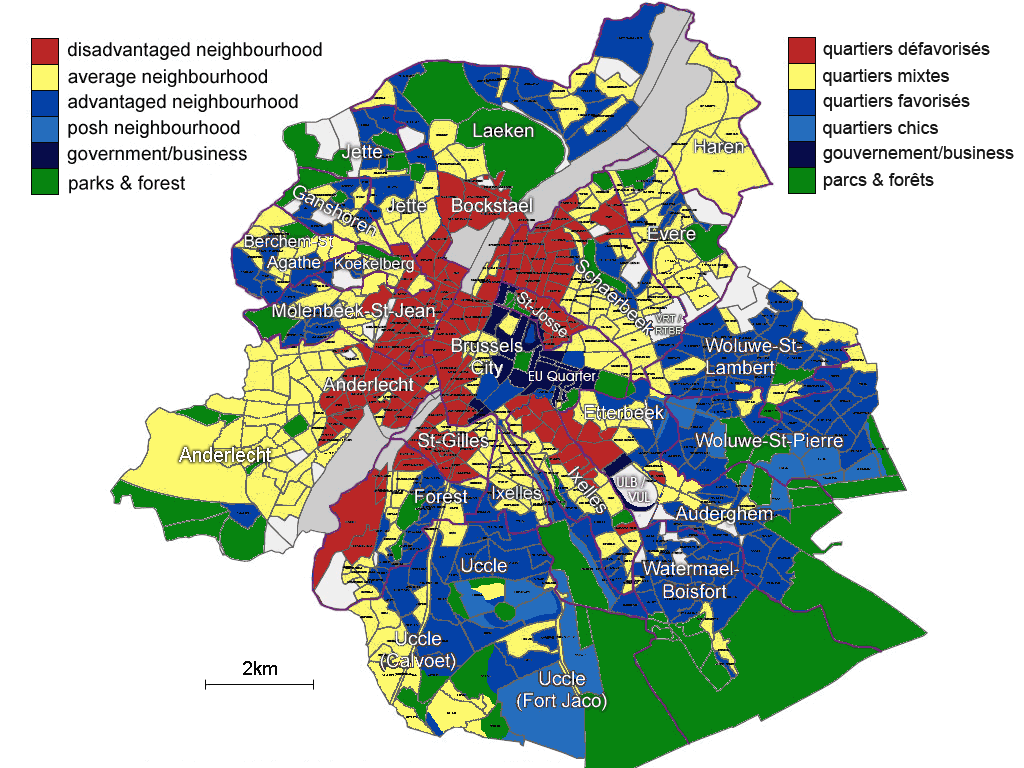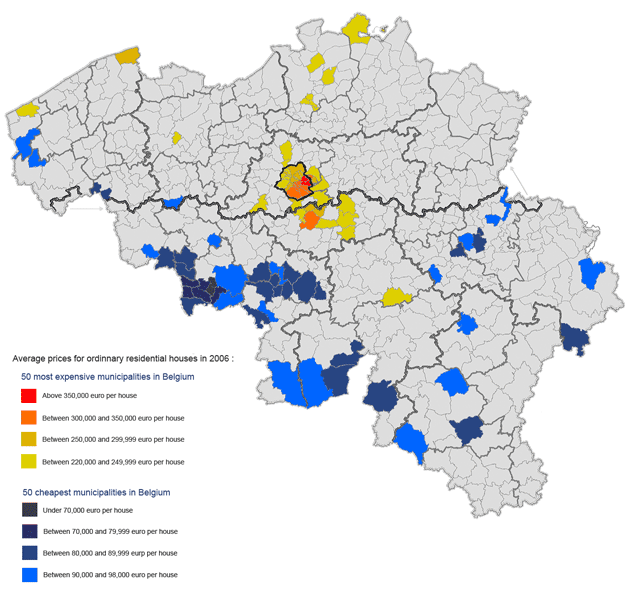It's not as simple as that.
1) Not all Flemings want independence. Even those in favour don't want it without Brussels.
Not all Flemings, but many, if not the majority of them. There are many in favour of it would tolerate it without Brussels.
Maciamo said:
2) Most Walloons want a unified Belgium. Should the country split, there is no consensus between Walloons as whether they should be an independent country or join France. Actually most Walloons cannot conceive an independent Wallonia without Brussels. I like to compare Belgium's case to Israel and Palestine, without the religious and ethnic divide. Both Israeli and Palestinians see Jerusalem as their capital and can't imagine their respective country without it. The Flemings and Walloons and the same feeling toward Brussels. Brussels is historically a Flemish city but is 80% French-speaking, and most French-speaking Brusselers either have roots in Wallonia or relatives in Wallonia.
Yes, many Walloons do want a unified Belgium. Many fear that without Flanders, the economy in Wallonia will shrink even further, as they won't get the subsidies that the Flemish give them. If the Walloon government doesn't change their anti-business policies; then this will happen. If they changed their policies, then business would come to Wallonia, and Wallonia would prosper.
Maciamo said:
3) The German-speaking Community is only 75,000 people. They don't even have a city. They would either stay with Wallonia or join Luxembourg, with whom they share a border too and feel close due to their bilingual German/French education.
There are smaller countries, look at Monaco for example. The German-speaking community could survive on it's own as an independent country. I would be alright with them joining Luxembourg, and I do agree with you on that. They could stay with Wallonia, but I feel that they have more in common with Luxembourg. Another option is for the German-speaking Community to join Germany; though I doubt it would happen.
Maciamo said:
4) Another possibility, rarely mentioned but which makes a lot of sense in my opinion, is that Brussels, Wallonia (incl. German-speakers) and Luxembourg form a new state. After all Luxembourg was always part of Belgium historically, even when Belgium became an independent country in 1830. In 1839, the Netherlands asked the Belgian state that the historical duchy of Luxembourg be split in two, with the eastern half form an independent country with the Dutch king as its Grand Duke, in exchange for the recognition of the independence of Belgium. Nowadays half of historical Luxembourg is in Wallonia. Since Wallonia also has a German-speaking community and that half of it was historically part of Germany (
Principality of Liège/Lüttich), it is only logical that Wallonia and Luxembourg should be part of the same country.
Furthermore, both Brussels and Luxembourg hold seats of European institutions, so the whole Brussels-Wallonia-Luxembourg region could be unified as a European district similar to Washington DC. The impoverishment of Wallonia is mainly caused by the economic exile of the brightest Walloons to Brussels and Luxembourg, which border each extremity of Wallonia. I grew up in Wallonia and I know that almost any Walloon who wants to have a proper job goes to Brussels or Luxembourg (or further away, Paris and London being quite popular).
That is a very interesting idea, Maciamo. I would definitely be for it if Wallonia were richer. The income ago is the main impediment to your scenario. I could not find statistics on the per-capita income of Wallonia, but I could find them for the whole of Belgium.
The GDP (PPP) Per Capita for Belgium is: $38,826
The GDP (Nominal) Per Capita for Belgium is: $47,787
The GDP (PPP) Per Capita for Luxembourg is: $79,785
The GDP (Nominal) Per Capita for Luxembourg is: $107,206
The GDP Per Capita will be a bit lower for Wallonia, so there is a very large income gap between the two. Luxembourg is mostly wealth people. These people would not want to add around four million less wealthy people to their nation. If Wallonia became richer, and at around the same level of wealth as Luxembourg; I would support your proposal. But, at the time being, I don't see it happening.
Luxembourg and Brussels do have much in common, as you said; and they both have many EU institutions. Luxembourg and Brussels could unite to form some sort of EU capital district, but they would be two unconnected enclaves. Also, in your scenario; what would become of Luxembourg's Grand Duke? They are the world's last remaining grand duchy; so I would hope that they would retain that status.
Perhaps, the Walloon province of Luxembourg could join with Luxembourg. They both have the same name. They both speak French, and they both speak Luxembourgish. Luxembourg the region is larger in size than Luxembourg the nation. The reg of Luxembourg has a population of 273,638. The nation of Luxembourg has a population of 549,680. The nation of Luxembourg would still have more people than the province of Luxembourg, and the newly-created nation would have more land and room for economic and population growth and development.
Another option for Wallonia is to merge with France, they have similar cultures, the same language, close proximity to each other, etc. The German-speaking Community would be a problem in this scenario, as France does not have a good track record with linguistic and cultural minorities.
As I said before, I would support the scenario of Wallonia, Brussels, and Luxembourg joining together. The question is, how would the economy of Wallonia grow at such a rate to be comparable to Luxembourg?



